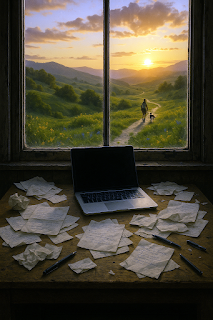Ah, the Canada day - Fourth of July weekend. Fireworks! Freedom! A glorious expanse of uninterrupted time stretching out like a freshly opened notebook, just begging to be filled with literary brilliance.
This, dear reader, is what I tell myself every single year.
"This is it!" I proclaim. "The long weekend where I finally finish that chapter, outline the next book, update my website, reorganize my plotting board, and maybe—maybe—even alphabetize my coffee and chocolate drawer. (Creative minds thrive on chocolate, okay?)"
I even tell my friends. With utter conviction. "Oh, I'm writing all weekend. No distractions. Just me, my laptop, and the sweet click-clack of productivity."
But then…
Well, then real life crashes the party with potato salad and a sun hat.
Let me set the scene. It's the first truly beautiful weekend we've had in forever. After an apocalyptic winter that left me questioning if I should start writing Narnia fanfic and a spring that could best be described as “moody,” the sun finally shows up. And with it, my dog Blueberry—the five-pound Papillon boss of me—starts giving me the look.
You know the one. The "We’re not spending this weekend inside staring at that glowing rectangle, are we?" look. The one that says, “Get your hiking boots, woman. This fluffball needs trail time.”
And so we hike. And frolic. And stop seventeen times to let Blueberry sniff one suspicious clump of grass.
Then there’s the laundry. I swear my laundry multiplies like plot twists in a paranormal cozy mystery. At some point over the weekend, my pile of clothes threatens to become sentient. I realize I’ve been grabbing socks from the ‘maybe clean?’ basket for four days, and it’s probably time to either do laundry or join a nudist colony.
And let’s not even talk about the five new episodes of my favorite show that dropped. I meant to watch just one—just one—for a brain break. Three hours later I’m deep in a Wikipedia rabbit hole researching 17th-century footwear because the villain was wearing suspiciously modern boots and now I have questions.
But don’t worry—I did open my manuscript.
I just also accidentally opened a tab to look up “how time travel works in fiction” because I had a little idea that maybe, just maybe, I could squeeze in a fun subplot. Which turned into reading a 9,000-word fan theory, two Reddit threads, and some scientific paper about wormholes that I’m pretty sure was written by an actual Time Lord.
And suddenly—poof!—it’s Tuesday. My manuscript is still blinking at me like, “You good?” and I’m sitting here wondering if anyone else feels like the long weekend just ghosted them.
I wasn’t ready. I need a do-over. A writer mulligan. Can someone talk to the time travel people and get me another go at that long weekend?
Please?
In the meantime, I’ll be here—half writing, half laundry-ing, half hiking (math is optional), and fully embracing the chaotic beauty that is summer, writing life, and the sneaky way weekends evaporate like popsicles on a porch.
Happy belated writing weekend, friends. Maybe next year I’ll actually finish that chapter. Or at least alphabetize the coffee and chocolate.
Maybe.

Comments
Post a Comment